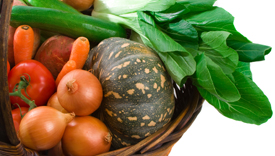 The word antioxidant has recently become a household word. I remember a time when only health care professionals spoke of antioxidants and their disease preventative qualities. Today you find food labels, magazine articles, and health alerts encouraging people to eat a healthy diet rich in antioxidants. You know they are good for you but why and how they work might still be confusing.
The word antioxidant has recently become a household word. I remember a time when only health care professionals spoke of antioxidants and their disease preventative qualities. Today you find food labels, magazine articles, and health alerts encouraging people to eat a healthy diet rich in antioxidants. You know they are good for you but why and how they work might still be confusing.
Let me share some important facts about antioxidants that are worth knowing. Throughout your life you are constantly being attacked by free radicals which are harmful to your body. Free radicals are molecules produced when your cells break down food. They also come from the environment in the form of tobacco smoke, radiation, chemical spills, and other toxic fumes.
The most common form of free radicals in human beings is oxygen. When an oxygen molecule (02) becomes electrically charged or “radicalized” it tries to steal electrons from other molecules, causing damage to DNA. As you age damage may become irreversible and lead to cancer and other diseases.
Antioxidants act as hunters to seek out free radicals and repair their damage. Antioxidants are often described as the cleanup crew. They wipe up free radicals, meaning they neutralize the electrical charge and prevent the free radical from taking electrons from other molecules.
The more you learn about the protective mechanisms of antioxidants the more you will be able to safeguard your body against the onset of diseases as you age. Although your body has defenses against oxidative stress, they become less effective with aging as free radicals begin to take their toll.
Research suggests that antioxidants may slow or even prevent the development of a number of degenerative diseases associated with aging, such as cancer, cardiovascular disease, cognitive impairment, Alzheimer’s, immune dysfunction, cataracts, and macular degeneration. Some chronic conditions can influence free radical formation which also contributes to poor health.
Examples of antioxidants include beta-carotene, lycopene, vitamins C, E, and A. One large clinical trial on antioxidants and cancer risk investigated the effect of a combination of beta-caroten, vitamin E, and selenium on cancer in healthy Chinese men and women at high risk for gastric cancer. The results showed a combination of beta-carotene, vitamin E, and selenium significantly reduced incidence of both gastric cancer and cancer overall.
Eat Your Way to Better Health
Eating the right foods is the secret to better health. You can find antioxidants in many foods including fruits and vegetables, nuts, grains, and some meats, poultry and fish. To be sure you are protecting yourself against harmful free radicals; choose foods and vitamins that contain antioxidant substances such as:
• Beta-carotene – found in many foods that are orange in color such as sweet potatoes, carrots, cantaloupes, squash, apricots, pumpkin, and mangos. You can also find beta-carotene in collard greens, spinach, and kale.
• Lutein – best known for improving the health of your eyes. It is abundant in green, leafy vegetables such as collard greens, spinach, and kale.
• Lycopene – a powerful antioxidant found in tomatoes, watermelon, guava, papaya, apricots, pink grapefruit, blood oranges, and other foods.
• Lignan – found in flax seed, oatmeal, barley and rye
• Flavonoids / polyphenols – found in soy, red wine, purple grapes, pomegranate, cranberries, and tea.
• Vitamin-like Antioxidants – Coenzyme Q10 (CoQ10), Glutathione
• Antioxidant enzymes made by the body – superoxide dismutase (SOD) ,catalase, and glutathione peroxidase
Other examples of antioxidant vitamins and minerals can be found in the foods you eat. You may also consider food supplements as a source for providing a daily dose of free radical protection.
The benefit of antioxidants in your diet cannot be underestimated. There are so many opportunities for you to eat foods that will protect you against harmful elements in the environment. Build an army of antioxidants to fight against your free radical enemies. Be smart; eat plenty of fresh fruits, vegetables, and whole grains. Don’t forget to consult your doctor before taking vitamin and mineral supplements to be sure they are right for you.
Stay Well,
Mark Rosenberg, M.D.
Natural Health News
